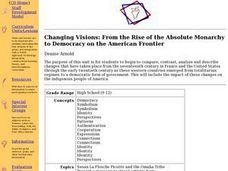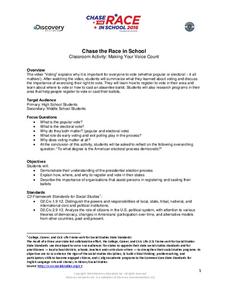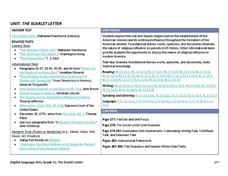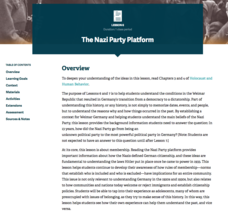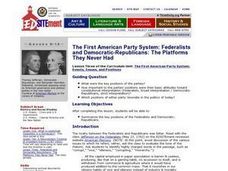Curated OER
The Early History of Haiti
Seventh graders make list of places Columbus explored on his first journey to Americas, locate island of Hispaniola on map, examine groups of people who have inhabited island, complete blank map and key of Hispaniola, and research early...
Curated OER
Lesson Plan: Early Political Parties
Pupils examine the platforms of early political parties in the United States. For this political parties lesson, students discover details regarding the attributes and ideals of the federalists and the democratic-republicans. Pupils...
Curated OER
From the Rise of the Absolute Monarchy to Democracy on the American Frontier
Students use a teacher-made museum guide with questions that allow them to analyze and compare the patron art of seventeenth-century France with portraits of later periods at the Joslyn Art Museum. Students also read The Little Prince...
Curated OER
Cold War Era Film Censorship: High Noon- a Slice of Americana Or Communist
Young scholars study of the effects of the Cold War on the home front. They analyze the film High Noon according to an abbreviated version of the standards that films were judged by in the early 1950s and determine whether or not High...
Curated OER
The First Years of the Union (1797-1809)
In this online interactive history worksheet, students respond to 11 short answer and essay questions about the United States between 1797 and 1809. Students may check some of their answers on the interactive worksheet.
Curated OER
The Federalist Defense of Diversity: Extending the Sphere
How did early Americans ensure expansion while also securing the rights of citizens? Alexander Hamilton and James Madison, two of our early leaders, considered the problem of faction to be the "mortal disease" that created unstable...
Curated OER
The Crucible by Arthur Miller
Understanding the historical context of Arthur Miller's The Crucible is an important part in understanding the play itself. Over 25 slides, the audience learns details of Miller's early childhood and some major events that were happening...
Chicago Historical Society
Are We the People?
Taking on the roles of a fiery Boston patriot, a Philadelphia merchant's wife, and a prominent abolitionist, your young historians will consider the reactions of these early Americans to the creation of the Declaration of Independence,...
Discovery Education
Making Your Voice Count
As learners watch a video on voting, they take notes on a worksheet that lists various voting topics, including electoral and popular votes, early voting, and exit polling. Then, young people research the Internet for their state's...
Curated OER
The Texas Revolution
Fourth graders examine the time period of the Texas Revolution. In groups, they research the contributions of Haden Edwards and Henry Raguet in the democratic process. Using primary sources, they place the events in the correct sequence....
Louisiana Department of Education
The Scarlet Letter
Use Nathanial Hawthorne's immortal text on the influence of religion on the early American settlements, as well as its continued impact on American culture, with a unit that focuses on The Scarlet Letter. In addition to Hawthorne's...
Curated OER
Changes In The New Nation: New Beginnings
Young scholars consider the role of American newspapers in the revolution and plans for new government. In this early American history lesson, students determine how communication provided by newspapers contributed to the organization of...
Curated OER
Geometry of Democracy
Students explore the architecture of New England by identifying geometric shapes. In this architectural lesson, students examine photographs of classic building architecture and use a transparency to trace geometric shapes they...
National Endowment for the Humanities
“Read All About It”: Primary Source Reading in “Chronicling America”
Can investigative journalism become too sensationalistic and accusatory, or is it vital for the survival of a democracy? Middle schoolers analyze primary source documents from early 20th-century newspapers as well as Theodore Roosevelt's...
Curated OER
Chapter 3 – Antebellum Innovation, Politics, and the Jackson Administration
The inter-war Antebellum Era was a fascinating time in U.S. History! In this textbook response worksheet, historians read assigned textbook pages regarding the topics and respond to 46 short answer display questions regarding the...
Curated OER
Daily Life in Ancient Greece
Sixth graders discover what everyday life was like for Ancient Greeks. In this Greek history lesson, 6th graders examine the cultural diversity of Ancient Greece and how it affected daily life for its citizens.
Curated OER
Building a Nation
Eighth graders identify the main ideas of the U.S. Declaration of Independence. They read and discuss text, read and summarize a section of the Declaration of Independence in small groups, and write a paper on why the colonists felt it...
Curated OER
The Early Tensions of the Cold War
High schoolers uncover the roots of the Cold War. In this Cold War lesson, students research the political philosophies of the Soviet Union and the United States during the era as they define key vocabulary and discuss government...
Curated OER
Case Study - England: Early 1600s
In this England in the 1600's case study worksheet, students read a brief overview pertaining to the time period in English history and then respond to 2 short answer questions.
Facing History and Ourselves
The Nazi Party Platform
Not all party platforms stay democratic. A resource covers many political issues in Germany during the time of World War II, and teaches pupils about the Nazi party platform and what went wrong. Individuals participate in a warm-up...
Constitutional Rights Foundation
The Election of 1912
The Election of 1912: an election with four competitive opponents. Pupils get to know the candidates with informative reading passages that provide context to the election. Then, the class engages in a debate and answers questions as one...
Curated OER
Ancient Greece: Athens as a City State
Sixth graders find Greece on the map and recognize how the geography of Greece was important in its development. In this ancient Greece instructional activity, 6th graders research Greece and compare to the civilization of ancient Egypt....
Curated OER
The First American Party System: Federalists and Democratic-Republicans: The Platforms They Never Had
Young scholars investigate the beginnings of the political party system in the US. They determine the key positions of both the Federalists and the Democratic-Republicans. They compare the views of the early political parties with those...
Curated OER
Slavery and Empire 1440 - 1770
Students reflect on the events that led up to slavery in the early years of North America. For this United States History lesson, students read excerpts from the book "Out of Many," then gather in small groups to answer specific...




